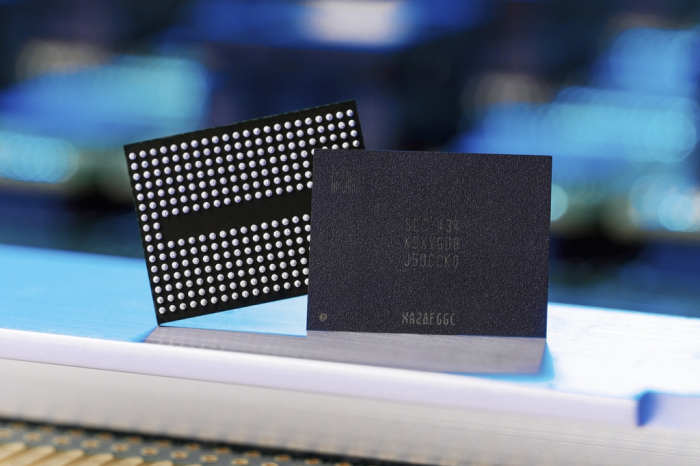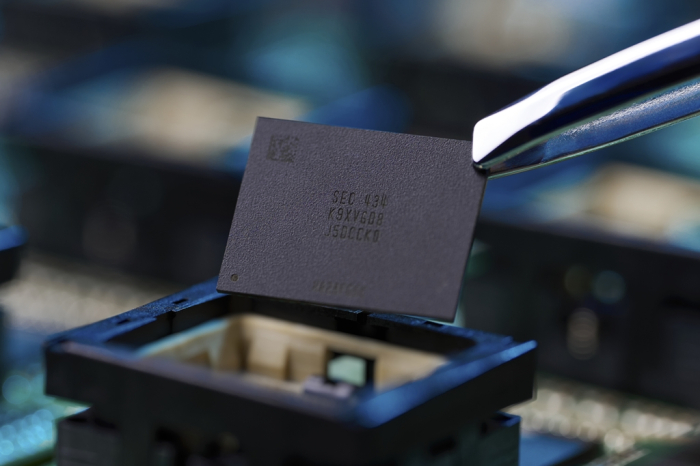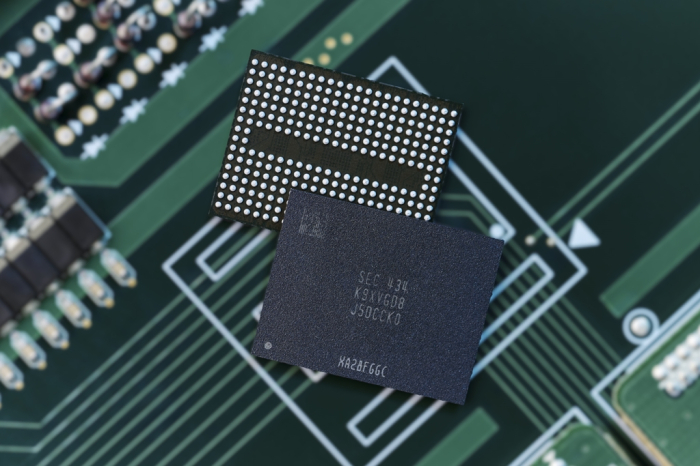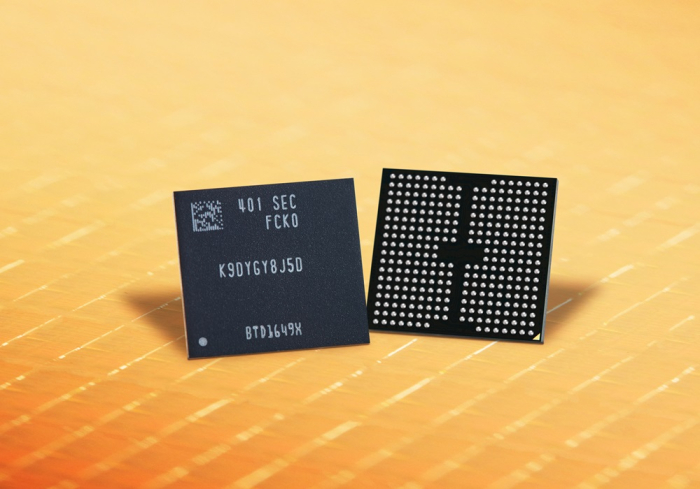Samsung mass-produces QLC V9 NAND to lead AI storage market
Already the dominant NAND player, Samsung’s new product targets large-scale enterprise servers and AI devices
By Sep 12, 2024 (Gmt+09:00)
When in S. Korea, it’s a ritual: Foreigners make stops at CU, GS25, 7-Eleven


Maybe Happy Ending: A robot love story that rewrote Broadway playbook


NPS yet to schedule external manager selection; PE firms’ fundraising woes deepen


Seoul appeal: Korean art captivates Indonesia’s affluent connoisseurs


K-pop stocks surge as China set to loosen cultural ban after 9 years



Samsung Electronics Co., the world’s largest memory chipmaker, said on Thursday it has begun mass production of a 286-layer high-capacity NAND memory chip to lead the fast-growing storage device market amid the artificial intelligence boom.
The South Korean tech giant said it is the industry’s first to produce one-terabit (Tb) quad-level cell (QLC) 9th-generation vertical NAND (V-NAND) in large quantities.
The output ramp-up follows Samsung’s mass production in April of triple-level cell (TLC) 9th-generation V-NAND, another type of NAND chip used to make solid-state drives (SSDs) – devices that store massive data in flash memory.
With the two types of V-NAND, Samsung aims to solidify its leadership in the high-capacity, high-performance NAND flash market.
“Kicking off the successful mass production of V9 NAND just four months after the TLC version allows us to offer a full lineup of advanced SSD solutions that address the needs of the AI era,” said Hur Sung-hoi, executive vice president and head of Samsung's Flash Product & Technology unit.

“As the enterprise SSD market shows rapid growth with stronger demand for AI applications, we will continue solidifying our leadership in the segment through our QLC and TLC V-NAND.”
INDUSTRY SHIFT FROM TLC TO QLC
Competition for NAND-based storage devices is fierce as AI chips focus on inference, which requires large-capacity storage devices to store and process images and videos.
A NAND flash is a non-volatile memory chip that stores data even when the power is off. It is currently used in devices like smartphones, USB drives and servers.
Samsung said QLC-based NAND will meet the growing demand for ultra-high-capacity SSDs used in AI data centers.
QLC NAND can store more data per cell than multi-level cell (MLC) and triple-level cell, or TCL, devices, significantly enhancing storage performance.

Already the dominant NAND player, Samsung controls about a third of the global market. Its cutting-edge 286-layer V9 NAND succeeds its 236-layer V8 flash products, targeting large-scale enterprise servers and AI and cloud devices.
For now, Samsung plans to focus on NAND products for AI servers but will increasingly expand its portfolio to NAND flash for on-device AI, automotive and edge devices.
STACKING TECH WAR INTENSIFIES
Major chipmakers are engaged in a heated race to develop advanced chip stacking technology to cut costs and improve performance.
To lead rivals in the industry’s transition to high-stacking high-density flash memory, Samsung is said to be set to unveil 430-layer NAND chips by the end of 2025.

Samsung said on Thursday it used “channel hole etching” technology to produce QLC-based V9 NAND, enabling the industry’s highest cell layer count in a double-stack structure.
The latest product, it said, has 86% higher bit density than its previous generation QLC V-NAND, 20% higher data retention performance, double the write performance and 60% faster data input and output speed.
Thanks to its lower power design technology, the QLC V9 NAND has reduced data read and write power consumption by about 30% and 50%, respectively.
According to market research firm TrendForce, global NAND flash sales will reach $67.4 billion this year, up 77% from last year.
QLC NAND is forecast to account for 20% of all NAND shipments this year, with the ratio set to pick up quickly in the coming years, it said.
Write to Jeong-Soo Hwang at hjs@hankyung.com
In-Soo Nam edited this article.
-
 Korean chipmakersSK Hynix unveils powerful data-center SSD to maintain AI memory lead
Korean chipmakersSK Hynix unveils powerful data-center SSD to maintain AI memory leadSep 11, 2024 (Gmt+09:00)
2 Min read -
 Korean chipmakersSamsung to unveil industry’s highest-capacity eSSD in November
Korean chipmakersSamsung to unveil industry’s highest-capacity eSSD in NovemberAug 19, 2024 (Gmt+09:00)
3 Min read -
 Korean chipmakersSamsung to unveil QLC-based NAND in H2 to lead AI storage market
Korean chipmakersSamsung to unveil QLC-based NAND in H2 to lead AI storage marketMay 22, 2024 (Gmt+09:00)
2 Min read -
 Korean chipmakersSK Hynix looks to expand AI memory leadership with new NAND chip
Korean chipmakersSK Hynix looks to expand AI memory leadership with new NAND chipMay 09, 2024 (Gmt+09:00)
2 Min read -
 Korean chipmakersSamsung to produce 290-layer V9 NAND to win chip stacking war
Korean chipmakersSamsung to produce 290-layer V9 NAND to win chip stacking warApr 11, 2024 (Gmt+09:00)
3 Min read -
 Korean chipmakersSamsung flexes NAND muscle with high-capacity microSD cards
Korean chipmakersSamsung flexes NAND muscle with high-capacity microSD cardsFeb 28, 2024 (Gmt+09:00)
3 Min read -
 Korean chipmakersSamsung’s new NAND boasts industry’s highest storage capacity
Korean chipmakersSamsung’s new NAND boasts industry’s highest storage capacityNov 08, 2022 (Gmt+09:00)
2 Min read


